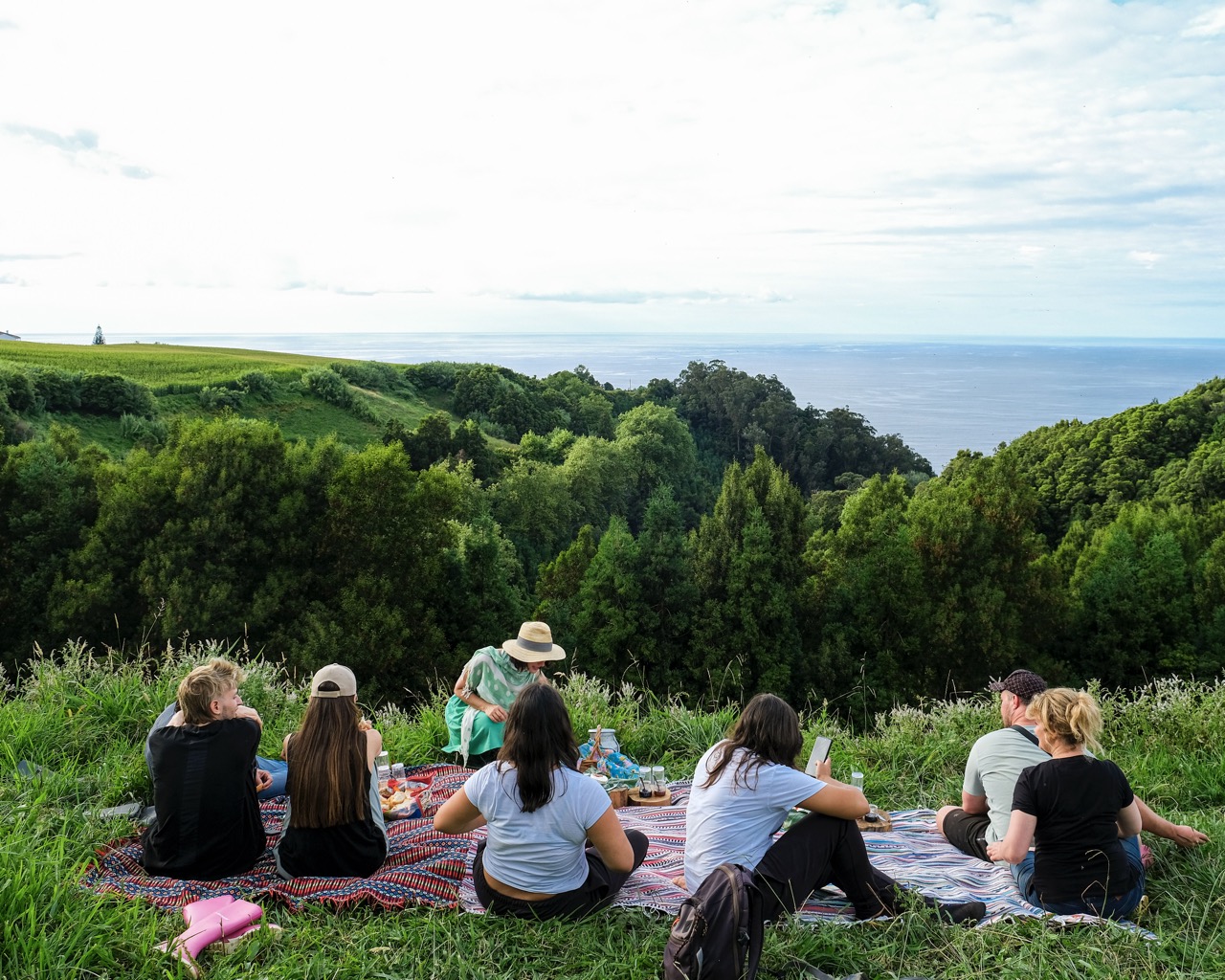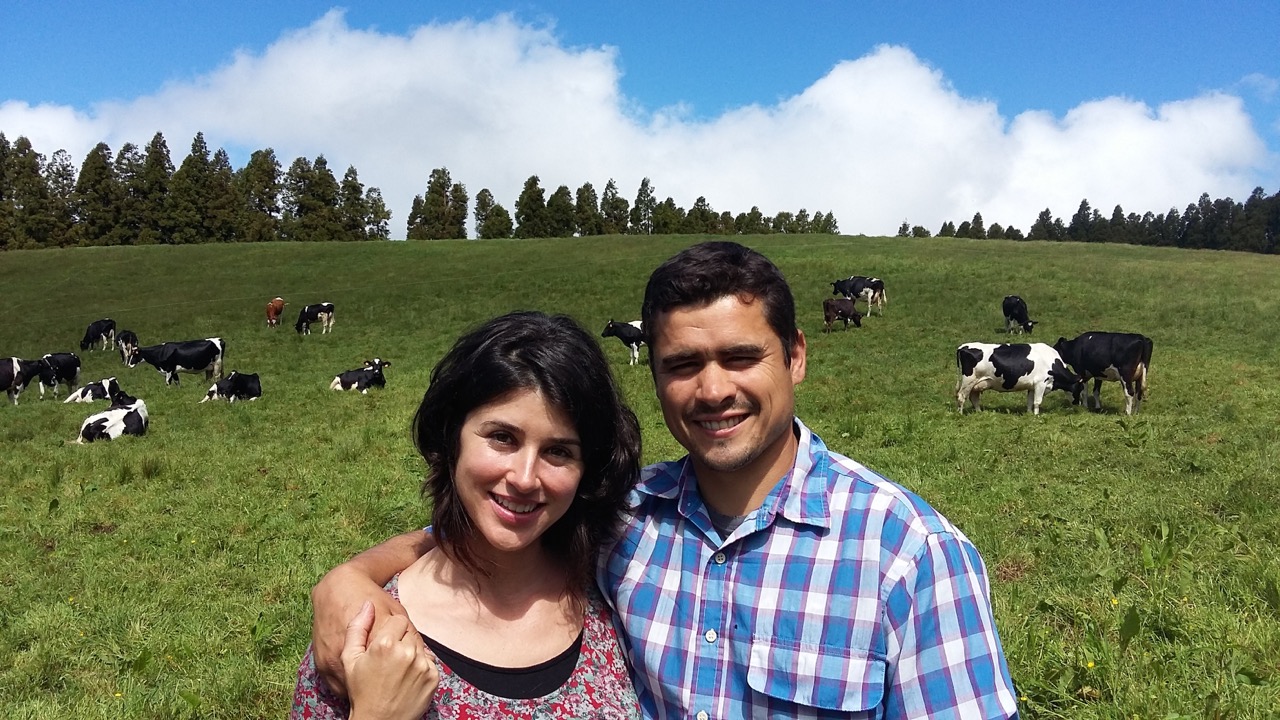In some ways there is nothing more traditional or iconic in the Azores than dairy farming. The islands are famous throughout Portugal not so much for their fish as for their cheeses, butters and milk. The landscape of São Miguel is shaped by green pasture land on which black and white cows graze, sometimes with amazing dexterity on steep slopes of defunct volcanoes. Many local Azoreans own a cow or two, perhaps a few more, and on our way to school we regularly cross paths with different men on horse-drawn carts trotting their pails of milk to the local drop off point. Azorean dairy farming is what Nordeste local João Pinheiro grew up doing and what he loves, however it was when he met his Californian-Azorean wife, Gena, that the two began to think of ways in which they could continue traditional farming on the island in a new, sustainable way which respected the land, the animals and the people who worked with them. The Ãmago Wellness farm is the result of their enormous labours over the last years and is proof that entrenched Azorean traditions can be harnessed in new ways to educate locals and visitors in the ethics and mysteries of food production, as well as producing some excellent milk and cheese. Gena is a passionate, knowledgeable, and eloquent ambassador of sustainable food here in the Azores and I learnt a huge amount from my short time with her.
Interviewer: Could you please tell me where you are from and a bit about your project here?
Gena: My name is Gena Pinheiro, born in California to Azorean parents, so American-Azorean. My father is from Terceira and my mother is from Faial. My husband is from São Miguel and together we started this life-dream project which we call Âmago Wellness Farm. Ãmago is a Portuguese word meaning our essence and our core – what is at the core of us and the beings around us.
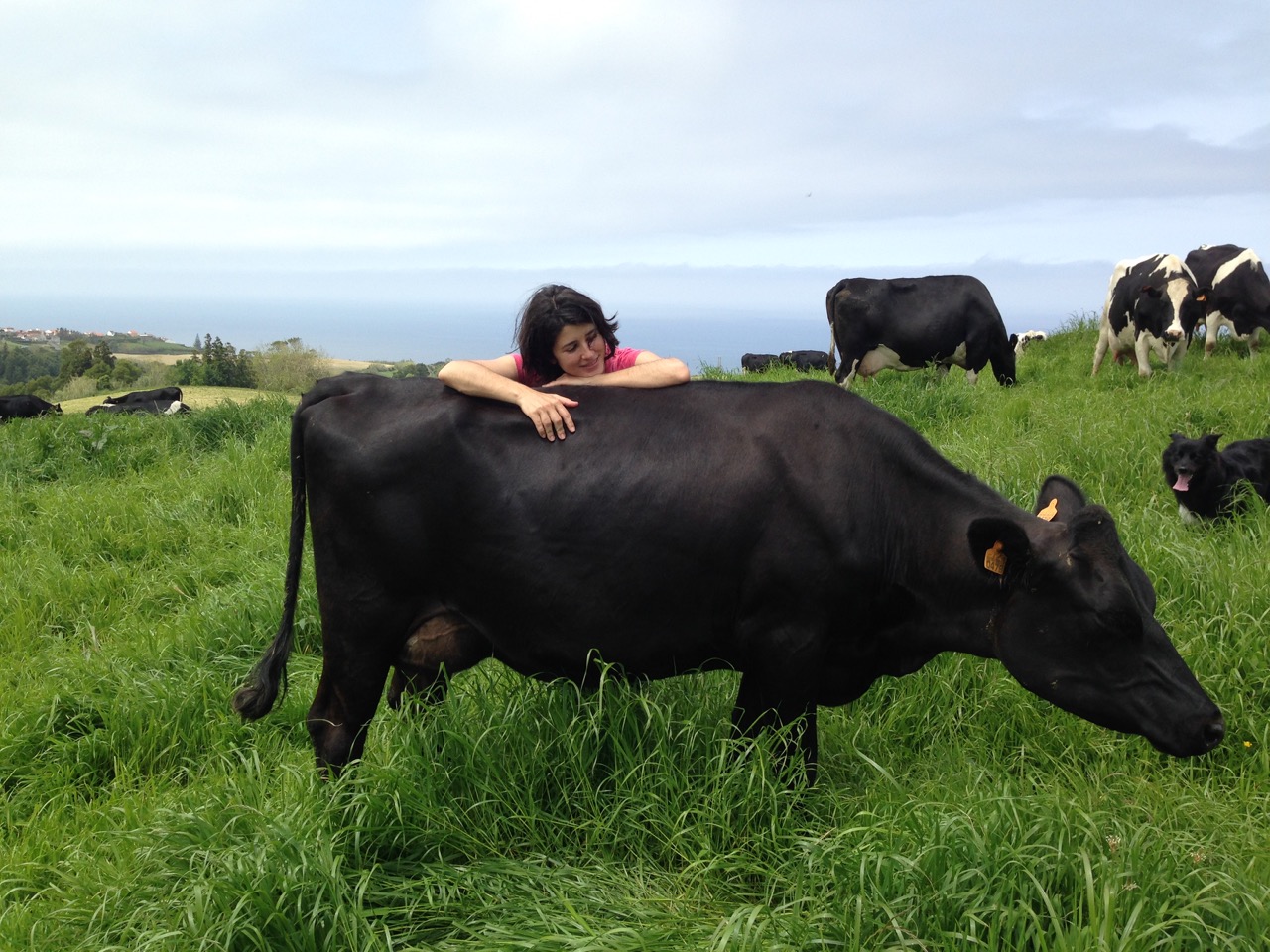
Interviewer: It seems you’ve done the opposite of the classic migration story when Azorean families went away to the states or Canada and made their lives there. You have returned from California. Can you talk a bit about that?
Gena: Before meeting João I would come on holiday with my family to the Azores and that’s how we met, in Terceira. I was with my family and João was finishing his mandatory army service. When I announced to the family that I was moving to the Azores, which had always been a dream of mine, my grandparents, bless their hearts and bless their souls, were in shock. They said: ‘How can you move there when we moved here to give you and everyone a better life?’ At first, they didn’t believe it and they went through a shock period. They went through many different emotions but then they started to talk so positively about the beauty of living here.
Interviewer: What do you think the most important change is between you and your grandparents? Is it that your dreams are just different to theirs, or is that the Azores itself has changed and there are more opportunities than there were decades ago?
Gena: Well, when we first moved here there weren’t that many opportunities! We’ve been here 11 years now and at that time the common thing that you heard is there are no jobs. There are no jobs here for our youth, there are no jobs for our community, you’re moving here but there are no jobs. That was the common consensus back then. What you see in the Azores now is not what it was like five years ago or ten years ago. I feel the Azores is almost stuck in time but then it takes this leap forward – not to say that it is a positive or negative, but it is a sudden leap. The islands start to emulate what is happening in the rest of the world, in other more developed countries. So, what you’re seeing in the Azores now is a leap towards tourism, whereas for many years it was a bit of a hidden gem. I think what drove my grandparents and what drives me differs a bit. They have fascinating stories. My grandmother migrated because her husband died. She was a young woman with one child, and she needed to find a way to offer her son a good living. She left my dad behind while she went to the US to plan out a life for them. My mother’s grandparents migrated after the eruption of Capelinas in Faial. My parents were young, and they still have heartfelt memories of the Azores and they have always come back but for my grandparents it was a subsistence-driven migration. For me it was almost the opposite. I was raised in the bay area of California, I had all the amenities that life could offer, yet I felt soulfully empty. Outwardly that was not what was being displayed because I had the financial means to go out to dinner, go to events, stay busy, stay social, have material comforts, but the internal part felt missing. It wasn’t that I didn’t have any of that, but I was still soul searching for something. I think this something was the old-world values that my grandparents instilled in me, and which are sometimes missing in modern day life: loyalty, trust and community, something with more depth. That’s what bought me here. And unfortunately, there is no gentle way to put this, but I do now see that community fabric starting to tear open here. People are more and more driven towards social media and towards presenting the kind of American affluent lifestyle that they believe we should aspire to.
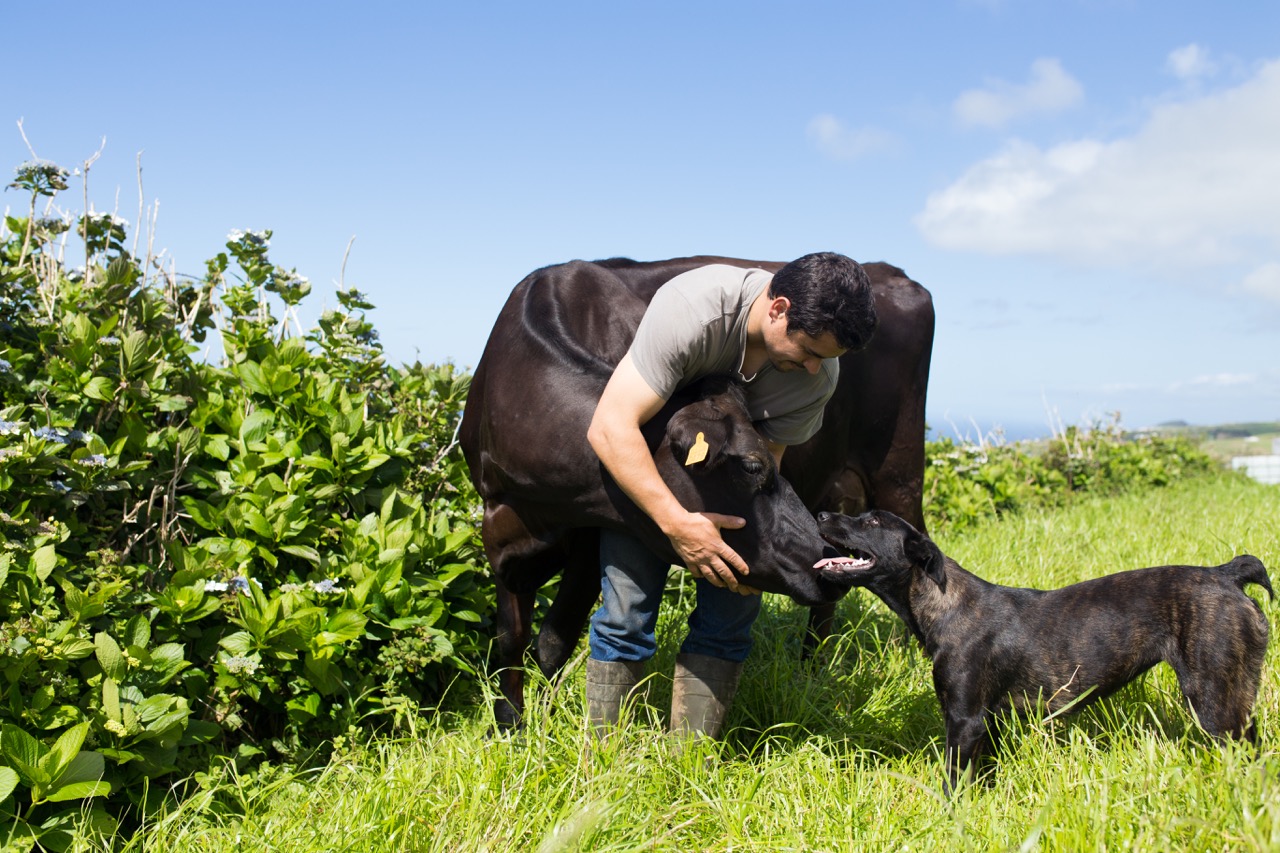
Interviewer: Perhaps things arrive slower here, but in the end they arrive. It’s interesting, how you talk about development, the good sides and bad sides to development. I don’t think you are the only one in the West who is searching for more meaning and a simpler way of life. Please tell me about the project you set up here.
Gena: I met my husband 22 years ago. He was raised here, in Achadinha, dairy farming with his father. This runs through his veins. He breathes it, loves it. He left all this when he migrated with his family to the US, where he lived for 12 years. I was studying at UC Berkley at that time and when I had time off, I would see him and vice-versa. After I graduated, I wanted to move to the Azores but he still wanted to experience life in the US. 11 years passed in which I worked for two government agencies and in their environmental programmes department. Then we started a certified green landscaping business. Time just went by although it wasn’t either of our passions. We started to search for that true meaning, we felt that yes, OK, our life is good, but it is lacking some depth. And it was when we were searching for that next step that we sold our business and moved to the Azores. This was the dream. Here we started exploring what were our most deep loves in life, our passions, and what we can do to focus our life on those things. I was suffering from a lot of health issues in California. We playfully named our move operation pink tongue because in Chinese medicine a white tongue means bad health. It was all about how to get healthy and happy and so I ended up studying and getting certified as a holistic health coach within this time. We bought this together with my sustainable development studies and João’s dairy farming experience. The result of all this is Âmago wellness farm which aims to connect people to themselves in a deeper way, to their food producers, to their food. It’s an effort to create those deep connections to those very important parts of being human.
Interviewer: How has the journey been from this beautiful idea to now, just over a decade later?
Gena: The journey has been a journey! There has been learning and introspection, for sure. Even though I consider myself Azorean, it’s Azorean-American and so I do have that American influence and view the world through those lenses. Even though I was raised by Azorean grandparents and went to a Portuguese Catholic school taught by nuns, spoke Portuguese in the school, had a very strict Catholic upbringing in the context of the US, I never had an agricultural background. It was eye-opening what you learn in the classroom versus the reality on the ground on our farm.
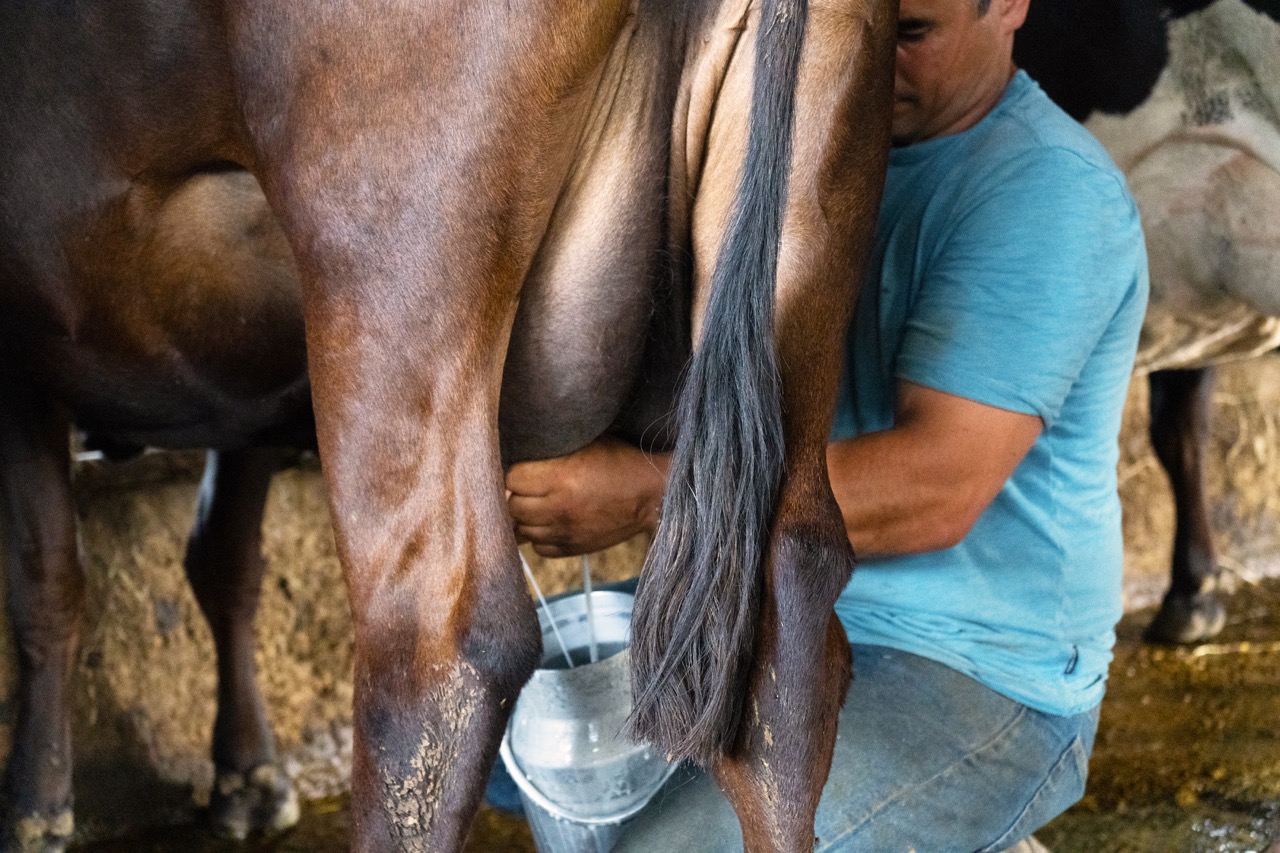
Interviewer: Did you always plan to work on a farm? Is that why you studied sustainable development?
Gena: No. You learn to trust in the universe, to realise, wow, it all came together so beautifully but there was so much struggle along the way. I learnt the realities of what it takes to feed a community, what it takes to put food on people’s plates, truly what it takes, and in many places it is very difficult to be an agricultural worker, the struggles are so real and I have so much appreciation and gratitude now, not just in dairy but in all areas of food production, it has been eye opening as I experience it hands-on.
Interviewer: That food education is so important. The industrialisation of food and what that is doing to the planet and us is such a fundamental question for everyone.
Gena: Absolutely. I used to be vegetarian, and I thought I understand it all, it was just so clear to me. But now I’ve learnt so much and realise I hardly understood a thing. I didn’t understand how the cycles of nature worked, I didn’t understand how the microbes under the soil worked, I didn’t understand water cycles. I started to understand a little bit with our green landscaping but now I have been able to connect it to larger agricultural processes and then connect gut health to it, through my holistic health coaching I focus on the microbiome and gut health. I became vegetarian because of the things I learnt on paper but now I am seeing how it all fits in this broader sense and learning more deeply about the ecology behind it.
Interviewer: It’s so interesting. So please tell me a bit more about your work as a health coach and how it all fits in with your work on the farm.
Gena: We do what we call reality farm tours, but I don’t want people to think it’s just a tour to pet a cow. We make it fun and interactive but at the same time we teach people what’s the reality of an Azorean dairy farmer, what are the struggles, how can you go back to your country and support food producers. It’s much easier to go to a supermarket, but we should remember we would be spending so much time working out how to feed ourselves, whether its hunting, gathering, growing, raising, all these things, you need to be fully dedicated and it would take all our time. Our agricultural workers make large sacrifices so we can travel and do different work. The reason why people get to come here and go on walks for their peace of mind is because they don’t have to worry about where their food is coming from. There are people working very hard and if you get anything from the wild, many people don’t realise all the processing involved in that. What you see in the supermarket is domesticated wild food. Seedless watermelons, seedless grapes. Even our cows are a domesticated version of the Auroch which no longer exists. The cow, the goat, the blueberries, the broccolis – all of these are domesticated versions manufactured to human desires. We want it bigger, sweeter, not so tart. We want it clean. We don’t want to spit out seeds.
Interviewer: And what does that do to our health, to have these domesticated versions of wild food?
Gena: Well, there are different perspectives to this. There is the perspective that wild foods are more nutritious because they have more antioxidants and have not been as modified as much. There is the example of raw milk versus pasteurised milk. Two different foods completely. There is an argument that wild foods are more nutritious, but it comes back to the argument – are we going to spend all our days hunting, fishing, gathering? It’s not reasonable today to do that. People want some comfort and I find that understandable. It’s about raising awareness, so that we are aware of how much work food production really takes. What will it take for us to be grateful for the people who are focusing on food production and to pay them what it actually costs to be feeding our communities? If it is too high a cost then we need to be pressuring our governments and our decision makers to put money into making good quality food accessible for the general population whilst making dignified living conditions for farmers. These are people who never go on vacation and who work 365 days a year, no holidays, no sick pay, doesn’t matter what happens, if someone dies in their family it doesn’t matter, if they don’t have help, they still have to go out there and work.
Interviewer: You are incredibly passionate and it’s inspiring and educating to hear your thoughts on these matters. What’s your overall dream for this project?
Gena: There’s a few different components but we want people to fully feel these things to their core, come to our farm, connect with their bodies. We want to help people with embodiment, connect them to their bodies, learn traditional food skills, how to feed yourself if you ever need to truly feed yourself from start to finish, fermenting foods, killing chickens humanely, plucking it, making a meal out of it. I want to disseminate these traditional food skills, so we don’t lose this wisdom of how to feed ourselves. Come to our farm and have this immersive, holistic experience, connecting deeply to all these facets. That’s the big picture for me, raising awareness about the realities of our food producers, where our food comes from, and raising awareness about our bodies, connecting to our bodies and something greater than all of us.
